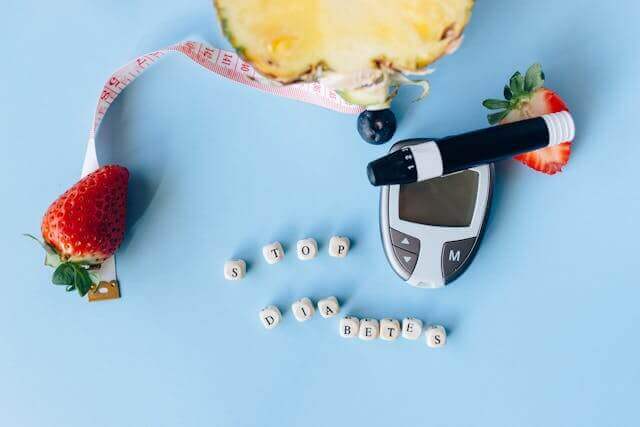Save 15% when you buy the Original Bottle Bundle!

Discover the 10 scientifically proven lifestyle changes for effective diabetes management.
What is Diabetes and how does it affect the body?
Diabetes is a disease that occurs when your blood glucose, also called blood sugar, is too high. It affects about 37 million Americans, including adults and youth. Diabetes can damage the eyes, kidneys, nerves, and heart. It is also linked to some types of cancer.
Living with diabetes requires a proactive approach to health, and lifestyle changes play a pivotal role in managing this condition effectively.
According to several studies referenced in the National Library of Medicine, adopting a healthy lifestyle can contribute significantly to blood sugar control, weight management, and overall well-being. Here are 10 key lifestyle changes that can make a positive impact on your health:
- Balanced Diet:
- Embrace a well-rounded, balanced diet that includes a variety of whole foods.
- Focus on complex carbohydrates, lean proteins, and healthy fats.
- Monitor portion sizes to regulate calorie intake and maintain a stable blood sugar level.
- Regular Exercise:
- Incorporate regular physical activity into your routine, such as brisk walking, swimming, or cycling.
- Aim for at least 150 minutes of moderate-intensity exercise per week.
- Strength training can improve insulin sensitivity and assist in weight management.
- Hydration Matters:
- Stay well-hydrated by drinking plenty of water throughout the day.
- Limit sugary beverages and opt for water, herbal teas, or infused water for added flavor.
- Stress Management:
- Practice stress-reducing techniques, such as meditation, deep breathing, or yoga.
- Chronic stress can impact blood sugar levels, so finding effective coping mechanisms is crucial.
- Regular Monitoring:
- Regularly monitor blood sugar levels as advised by your healthcare provider.
- Keeping track of your numbers can help identify patterns and guide adjustments in your lifestyle.
- Adequate Sleep:
- Prioritize quality sleep by maintaining a consistent sleep schedule.
- Lack of sleep can affect insulin sensitivity and contribute to weight gain.
- Quit Smoking:
- If you smoke, consider quitting. Smoking can worsen diabetes complications and increase the risk of heart disease.
- Alcohol Moderation:
- If you consume alcohol, do so in moderation. Limiting alcohol can help manage blood sugar levels and prevent complications.
- Regular Medical Check-ups:
- Schedule regular check-ups with your healthcare team to monitor your overall health.
- Discuss any concerns or changes in your condition with your healthcare provider promptly.
- Support System:
- Build a strong support system with friends, family, and healthcare professionals.
- Sharing your journey with others can provide encouragement and motivation.
- Join support groups such as the Facebook Diabetes Group
Remember, the key to successful diabetes management lies in consistency and making sustainable lifestyle changes. Consult with your healthcare team to create a personalized plan that aligns with your needs and goals. By taking a proactive approach to your health, you can not only manage diabetes effectively but also improve your overall quality of life.
Bonus Section - Foods and herbs that may you manage your Diabetes
Foods for diabetes management:
- Leafy Greens:Spinach, kale, and collard greens are rich in nutrients and low in carbohydrates, making them excellent choices for managing blood sugar levels.
- Berries: Blueberries, strawberries, and raspberries are packed with antioxidants and fiber, and they have a lower impact on blood sugar compared to some other fruits.
- Whole Grains:Opt for whole grains like quinoa, brown rice, and oatmeal, which provide fiber and essential nutrients without causing rapid spikes in blood sugar.
- Fatty Fish:Salmon, mackerel, and sardines are high in omega-3 fatty acids, which have anti-inflammatory properties and may improve insulin sensitivity.
- Nuts and Seeds:Almonds, walnuts, chia seeds, and flaxseeds are sources of healthy fats, fiber, and protein, promoting satiety and helping regulate blood sugar.
- Beans and Legumes:Lentils, chickpeas, and black beans are rich in fiber and protein, contributing to stable blood sugar levels.
- Greek Yogurt: High in protein and low in carbohydrates, Greek yogurt can be a good option for those with diabetes. Choose plain, unsweetened varieties.
- Cinnamon:Some studies suggest that cinnamon may help improve insulin sensitivity. Sprinkle it on foods or add it to beverages for flavor.
- Avocado:Rich in monounsaturated fats, avocados can help manage blood sugar and provide a satisfying source of energy.
- Garlic:Garlic has potential benefits for diabetes, including improving insulin sensitivity and reducing inflammation.
Herbal teas for diabetes management:
- Green Tea: Contains antioxidants and compounds that may improve insulin sensitivity and reduce blood sugar levels, according to the National Institute of Health.
- Purple Tea: Reduces glucose absorption in food, resulting in lower glucose levels. Its unique phytochemicals effectively lower serum glucose levels.
- Chamomile Tea: Known for its calming effects, chamomile tea may help reduce stress, which is beneficial for diabetes management.
- Mulberry Leaf Tea: The mulberry leaf has been used for medicinal purposes for centuries. Some studies show that consuming mulberry leaf tea on a regular basis will reduce blood sugar and promote weight loss, among many other benefits.
- Cinnamon Tea: Besides adding cinnamon to foods, you can also enjoy it as a tea. It may contribute to better blood sugar control.
- Ginger Tea: Ginger has anti-inflammatory properties and may help improve insulin sensitivity.
- Hibiscus Tea: Some studies suggest that hibiscus tea may have a positive impact on blood lipid levels and blood pressure.
- Fenugreek Tea: Fenugreek seeds have been associated with improved glucose metabolism, and you can make a tea using these seeds.
Remember, it's crucial to consult with your healthcare team before making significant changes to your diet or incorporating new herbal remedies, especially if you are taking medications.
Finally, have a support system:
- Build a strong support system with friends, family, and healthcare professionals.
- Sharing your journey with others can provide encouragement and motivation.
- Join groups and such as Facebook Diabetes Support Group
These suggestions can be part of a balanced and varied diet and lifestyle that aligns with your individual health needs.
Remember, the key to successful diabetes management lies in consistency and making sustainable lifestyle changes.
Consult with your healthcare team to create a personalized plan that aligns with your needs and goals.
By taking a proactive approach to your health, you can not only manage diabetes effectively but also improve your overall quality of life.
Live. Love. Be Healthy.


